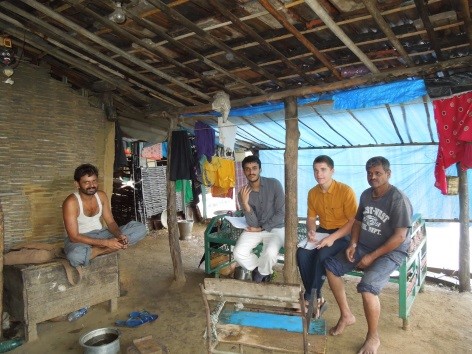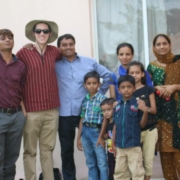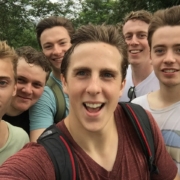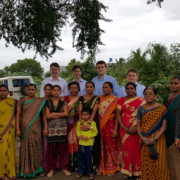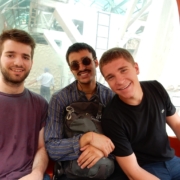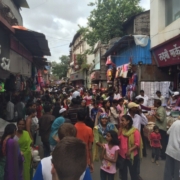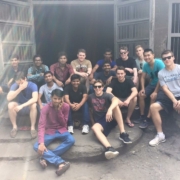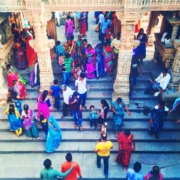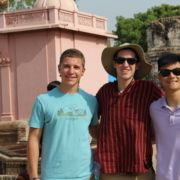Internship at EDI Leads to Suruchi
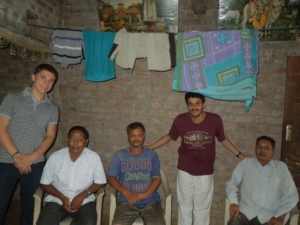 Week four began with an early morning train ride to the rural town of Bardoli with our new sister and EDI employee, Mahima Behen. We would be conducting field research of a proposed blacksmithy cluster with stakeholder interviews and field visits. Our train arrived in Surat around 10AM where we stopped for some chai before hopping on the bus line that would take us to our destination. Our ride took us an hour outside the city through sugar cane fields and rice paddies to our accommodation at Suruchi.
Week four began with an early morning train ride to the rural town of Bardoli with our new sister and EDI employee, Mahima Behen. We would be conducting field research of a proposed blacksmithy cluster with stakeholder interviews and field visits. Our train arrived in Surat around 10AM where we stopped for some chai before hopping on the bus line that would take us to our destination. Our ride took us an hour outside the city through sugar cane fields and rice paddies to our accommodation at Suruchi.
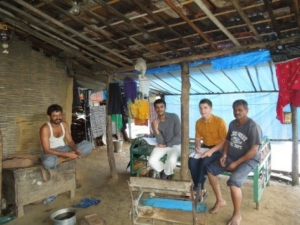 We were being put up by Mr. Ramkumar, the creator of the Suruchi. Suruchi is involved with the production of agriculture tools, vermicompost, organic seedlings, and solar cookers to employ and support local blacksmiths, farmers, and women. Currently, the organization is waiting for funding from a government scheme that will aid in the creation of a blacksmithy cluster. Suruchi has many different interventions planned to create a strong network of geographically dispersed artisans and to save a traditional trade being destroyed by the rapid industrialization of India.
We were being put up by Mr. Ramkumar, the creator of the Suruchi. Suruchi is involved with the production of agriculture tools, vermicompost, organic seedlings, and solar cookers to employ and support local blacksmiths, farmers, and women. Currently, the organization is waiting for funding from a government scheme that will aid in the creation of a blacksmithy cluster. Suruchi has many different interventions planned to create a strong network of geographically dispersed artisans and to save a traditional trade being destroyed by the rapid industrialization of India.
We were given a two bedroom, two bathroom cabin, equipped with a small dining room and porch. The bathroom was modest and electricity and running water were never certainties but our home for the next week was quiet and relaxing. Our meals were prepared by Masi and were simple and delicious as the ingredients had been harvested from our cabin’s backyard. It was great to get out of the city to replace the nonstop honking with the sound of birds and wind rushing through the fields. Life slowed down for us and we were able to experience a unique and beautiful side of India we had yet to see.
Monday we walked through the blacksmith production facility at Suruchi and sat down to talk with the artisans who worked there. We saw the process from raw materials to finished goods which were sold out of the front of the production facility. With Mahima Behen as our translator, we got an insight into the blacksmith’s feelings and attitudes towards their trade, its future, and their relationship with Suruchi. It was a great day and we were excited for our field visits the next two days.
Our evenings were spent relaxing with yoga and meditation and discussing our cultural differences with Mahima Behen over cards. We shared many laughs and the three of us grew to become good friends.
Our second day was spent visiting rural blacksmiths who work from the front of their homes with very limited technology and resources. We drove for hours through endless fields of green and crops with small markets and gathering places scattered throughout. The roads were rough and the journey demonstrated the transportation challenges people who live in these areas face. We saw several different sized operations on Tuesday and were greeted with food and chai no matter what type of home we stopped at. Seeing the artisan’s workspaces and speaking to them gave us insight into the realities of the proposed cluster and rural life in India.
The third and final day of field visits we visited the farmers who used the tools produced by the blacksmiths and purchased vermicompost from Suruchi. The hospitality continued; water came first, followed by chai, and maybe some lunch depending on the time of day. We discussed the current shift towards organic farming and what they see in their future. We were walked through their fields and shown their compost operations and came to understand the harmony that exists between farmers, blacksmiths, and Suruchi.
Thursday we had a debrief meeting with Mr. Ramkumar and began to compile the data we had collected into a report. That evening we made friends with several of the children whose parents were living and working at Suruchi. We ran around barefoot and made games out of whatever rocks or sticks we could find and overcame our language barrier with smiles and laughs.
Our final day we continued to work on our report and relish our last few moments in rural India as our train back to Ahmedabad was leaving early the next morning. Our trip to Suruchi was what we hoped to get out of this internship experience. We were given a chance to immerse ourselves into a community, speak with its people, make friends, see how they work and live and how business functions in such an environment. We read about the challenges of rural blacksmith businesses and farmers before our field journey but we only came to understand them from diving in and interacting with the artisans. We came to understand the NGO Suruchi and the challenges it shares with NGOs around the world as well as the unique challenges India throws at them. We saw a different side of India we were not exposed to thus far and we enjoyed every moment of it and learned so much.
It is sad to think our time here is two thirds over as we move into week 5. We will be spending the remainder of our work period compiling our final report and reflecting on our experience in Bardoli as well as relishing every last moment in Ahmedabad.
Joe Fernandez & Sachin Babbar, GEO EDI interns
